S DORAISAMY, 69, is known in Chennai’s legal circles as a man of conviction. He actively participated in DMK campaigns and was close to top-ranking LTTE leaders, including V Prabhakaran. Practising at the Madras High Court since 1970, criminal law was Doraisamy’s fascination more than specialisation. He was detained during the Emergency and underwent a year’s imprisonment just 10 days after his marriage. He was defense counsel for Nalini, who was given death sentence, later commuted to life, in the Rajiv Gandhi assassination case. Now, Doraisamy has written a book, claiming to unravel the mysteries and nail the bunglings by the Special Investigation Team (SIT) headed by DR Karthikeyan. The soon-to-be published book, tentatively titled Mysteries and Secrets Behind the Rajiv Gandhi Murder, alleges a larger conspiracy. The SIT chargesheeted 26 accused, of whom 19 were acquitted by the Supreme Court. The SC upheld the conviction of seven people on the basis of confessions made when they were in SIT custody. In a candid chat, Doraisamy tells Jeemon Jacob about the revelations in the book. Tehelka, however, cannot vouch for the veracity of the claims made by Doraisamy in this interview.
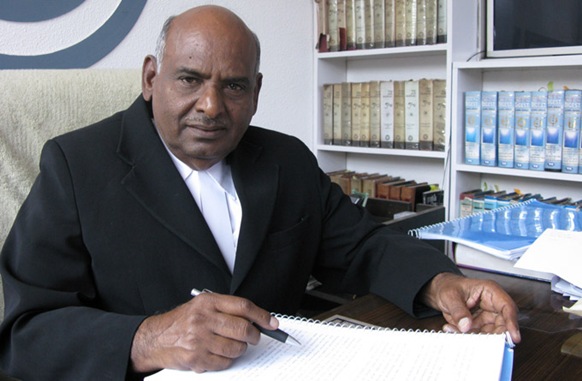
Conspiracy theory Doraisamy says the SIT botched up the probe into Rajiv Gandhi’s murder
Photo: Jeemon Jacob
Excerpts From An Interview
You have appeared for Nalini, one of those convicted in the Rajiv Gandhi assassination case. Now, 11-and-a-half years after her sentence was confirmed, you have come up with a book saying there was a bigger conspiracy in the case and it’s an inside job. What evidence do you have to support your allegations?
I have the evidence to prove that the Rajiv Gandhi murder was an inside job. But the SIT headed by then Inspector General of Police DR Karthikeyan never pushed the investigation in the right direction. The CBI took over the investigation on 24 May 1991, three days after the brutal murder. The team consisted of Karthikeyan, four DIGs, eight SPs, 14 deputy SPs, 44 inspectors and 55 subinspectors and constables. The members were handpicked by Karthikeyan. Most of them have a proven track record. They investigated the case for almost a year and filed the chargesheet on 20 May 1992. But the chargesheet revealed holes in the investigation and the bungling of the SIT. Even a constable would have done a better job in the case if he had got one year to investigate it. The designated court has convicted all the accused and it’s a fact that the SC acquitted 19 of the accused as the court found there was no substance in the evidence produced to prove their role in the conspiracy.
You are making only general statements regarding the SC verdict. Would you give supporting evidence to prove your point that there was a bigger conspiracy?
Rajiv Gandhi was assassinated on 21 May at 10.20 pm at Sriperumbudur when he was about to campaign for Maragatham Chandrasekar, the Congress candidate. Rajiv had already completed his campaign in Tamil Nadu. But on 18 May, the All India Congress Committee (AICC) charted his tour and included the campaign at Sriperumbudur after Visakhapatnam. But Dina Thanthi, a Tamil daily, published a news item on 17 May that Rajiv was going to address an election rally at Sriperumbudur on 21 May. None of the Congress leaders were aware about such a meeting. On 18 May, the committee responsible for Rajiv’s tour programme held a meeting at AICC and finalised the tour. How was the Dina Thanthi reporter able to write a story on Rajiv’s tour schedule before it was finalised by the AICC?
On 19 May, Vazhapadi Ramamurthy, then Tamil Nadu Congress chief, objected to Rajiv addressing a rally at Sriperumbudur and staying there — he made this clear when he deposed before the trial court. His objections were never taken into consideration as Maragatham was using her clout in Delhi to get Rajiv to address a meeting in her constituency. So the meeting was scheduled and local Congress leaders approached the police authorities to grant permission to hold the meeting at a school ground. But later, for reasons known to Maragatham, the venue was changed to a temple ground.
For changing the venue, the Congress leaders never sought police permission. And there was no proper security arrangement at the meeting. Despite Congress leaders’ objection, Rajiv was scheduled to stay at Sriperumbudur where there was only a tourist bungalow in a dilapidated state. Then Tamil Nadu Governor Bhishma Narain Singh objected to Rajiv’s stay in Sriperumbudur. But the Congress leaders were told that Maragatham would take care of his stay at her village and she had found a pawnbroker’s house for his stay. But police officials ruled out the house on security grounds.
Holes in the SIT Probe
• Who manufactured the belt bomb for Dhanu? From where was the denim for the belt and the RDX purchased?
• What was the role played by the businessman Deril Peter who was killed in Sriperumbudur? He was booked to fly to the US on 30 May. His wife, who was working with Central Public Works Department, later migrated to the US.
• Why were AICC officials reluctant to cooperate with the probe? They did not reveal the original tour schedule, saying it was with the party spokesperson. Later, a schedule was handed over to the CBI on 28 November by a Delhi Police SI.
• The husband of Latha Kannan, who was a Class IV employee, bought a lorry after the assassination. (Latha and her daughter were in the queue to garland Rajiv along with Dhanu.) Where did he get the money?
• SIT DIG Sri Kumar was sent to London for investigation. His report was never produced in the trial court nor was he crossexamined. During his visit to London, he said that a box containing important case files was lost. But no action was taken.
• MK Narayanan, then IB director, wrote to the Cabinet Secretary saying the IB was in possession of a video of the Sriperumbudur rally. But it was never produced as evidence.
• Shanmugam, a small-time smuggler, took his life in SIT custody. His death is still a mystery.
But you can’t blame Maragatham for facilitating the killers on these grounds. Do you have any other evidence to prove her role?
I don’t blame her for the conspiracy for killing Rajiv. But the evidence is against her. In (prime accused) Sivarasan’s diary, it’s stated that he had paid Rs 5 lakh as donation to Lalit Chandrasekar, Maragatham’s son, for organising the Sriperumbudur rally. This was revealed in his book by Ragothaman, chief investigating officer of the SIT, that probed the Rajiv case. But when I cross-examined him, he never divulged such information nor produced the diary before the trial court as evidence. In his book, he also stated that when he went to meet Lalit, who was in hospital after the blast, he asked him whether he could identify (the suicide bomber) Dhanu from a photograph. He said that he didn’t remember her. But his daughter, who was deaf and dumb, tried to identify Dhanu. Then Lalit became angry and asked his wife to take his daughter away from the room. But the CBI never investigated the reasons behind the Rs 5 lakh donation and how Sivarasan and Dhanu came in contact with Maragatham’s family. It’s a fact that Lalit’s wife was a Sri Lankan Tamil.
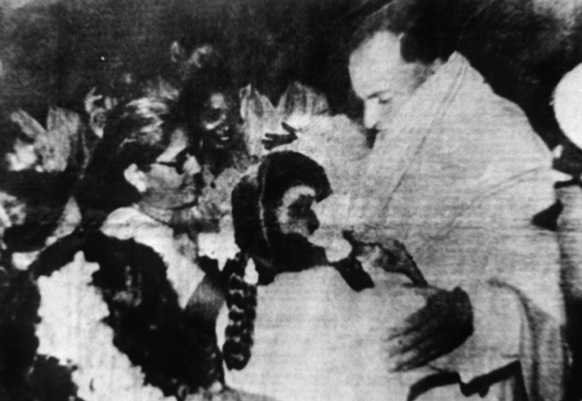
Conspiracy theory Doraisamy says the SIT botched up the probe into Rajiv Gandhi’s murder
Photo: AFP
I’m sure that Sivarasan would not pay Rs 5 lakh for nothing. If he had paid Rs 5 lakh, he received help from Lalit. Even after the book was published, Lalit never sued Ragothaman. When I was cross-examining Maragatham, I specifically asked her whether she knew any of the accused, especially Sivarasan or Dhanu. But she objected to the question and approached the court to grant permission to take legal action against me for making such remarks. The court granted the permission, but she never sued me for that remark.
Why have you stated in the book that there was a bigger conspiracy involving powerful people at the national or international level behind Rajiv’s assassination?
Right from charting the tour programme to the execution of the murder, there was the hand of the unknown. The entries in Sivarasan’s diaries were vital pieces of evidence. In the entries, Sivarasan had noted, “Departure of Rajiv 4.30 pm; arrival at Madras 6 pm.” But the helicopter could not take off from Visakhapatnam until 6.15 pm due to a technical snag. But Sivarasan had known the flight was delayed. According to the SIT, he was travelling in a bus from Madras to Sriperumbudur. There were no mobile phones or pagers then.
So it’s clear that Sivarasan was informed about the delay and later he was sure that Rajiv would address the meeting. It was not accidental or guesswork. At least I don’t believe that Sivarasan had the sixth sense to know about things happening in Visakhapatnam when he was travelling in a bus.
Anything more on the conspiracy angle?
Yes. When Rajiv was boarding from Vizag, three strangers, including a woman, approached him, breaking the security cordon. This was stated by the station officer of the naval airport. The police never verified their identity and they vanished after the aircraft took off from Vizag. So it proves that Rajiv’s movements were monitored closely. But the SIT never investigated that angle.
Your book reveals that Sivarasan had visited Bhopal and paid Rs 1. 71 crore to TAG. Do you know who TAG is?
No idea. One of Sivarasan’s diaries, seized from the house of Jayakumar (marked as evidence No. MO 180) says he had paid Rs 1.71 crore to TAG and the balance was Rs 45,000. The diary notings were dated 13 March 1991. But the SIT never followed the leads. If it had done so, it would have unravelled the conspirators behind the Rajiv murder case. But unfortunately it didn’t happen and innocent people were prosecuted. The amount was not paid in cheque, it was hard cash. His entry dated 8 March 1991 mentions a place in Madhya Pradesh:
State of Madhya Pradesh
Guna District
Santheri Hills
Bungalow owned Gwalior rani
Changed to Bihar.
Aathirai, one of the accused in the Rajiv case, moved a petition before the Madras High Court stating that she wanted to disclose more information about Sivarasan on 25 September 1992. Her petition reads as follows:
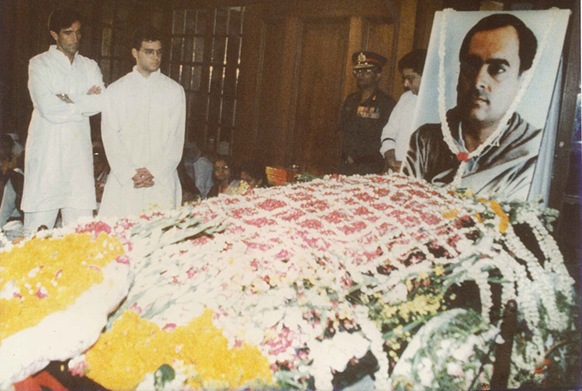
Murder most foul: Rahul Gandhi pays his last respects
“When I was in Jaffna, I met one Sivarasan who had left the LTTEmovement and was frequenting India. I sought his help to go to Germany from India. On arrival at Madras, Sivarasan told me he has been engaged by some Congress leader to do a certain job and offered a large amount and a job in a foreign country. He asked me to join him in the execution of the job. But I refused. He later confided that one Mr Kalyanaraman, manager at AICC headquarters, had entrusted him with the execution of the job and informed me that Rajiv would visit Madras on 21 May and would stay at Sriperumbudur. On 22 May, Sivarasan told me he had executed the job with Dhanu’s help. He told me to go to Delhi and said Kalyanaraman would help me get a passport to go to Germany.”
But nobody took notice of her petition and the CBI never verified whether her statements were true.
Your book reveals the drama and foul play in the Bangalore operation. Then why was it never exposed?
On 29 July, Bangalore Police had informed the SIT chief and Delhi that Sivarasan, his associate Subha and seven others were hiding in Indira Nagar. The police got the information when they questioned Vicky at Coimbatore for traffic violations. But the SITwaited for four days to act. If they had acted with NSG commandos on 29 July, they could have caught Sivarasan and his associates alive. More than that, who offered the safe house for Sivarasan and the gang in Bangalore? It was unusual for Sivarasan, who is a trained LTTE operative, to go to Bangalore. It was easy for him to reach Vedaranyam and go to Sri Lanka. But somebody might have assured him that in Bangalore he could be safe. When his body was found, there was a 9 mm pistol and an AK-47 near it. Who provided these weapons to him? None of his associates could have done that. But no probe was conducted in this regard. And the dead won’t speak in the court.
So are you saying that the SIT and the Congress never wanted to expose the conspiracy behind the murder?
Yes, I believe so. Right from the blast, there were repeated efforts to suppress evidence. It was not accidental but deliberate. The police recovered Haribabu’s camera from the blast site. They could have developed the film roll and identified the killers within five hours. Instead, the photographs mysteriously appeared in The Hindu on 25 May. But The Hindu didn’t publish Sivarasan’s photograph till 29 May. Nobody probed how the newspaper got the photographs taken by Haribabu, which was prime evidence in the investigation. Later, all the videos of the Sriperumbudur meeting taken by three videographers were found to be tampered with and erased. The explanation given by the SIT was that they erased the visuals by mistake. I don’t subscribe to their vague explanations.
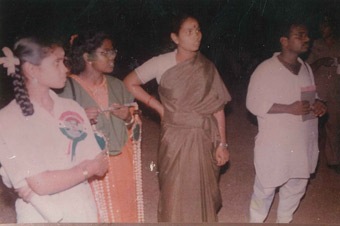
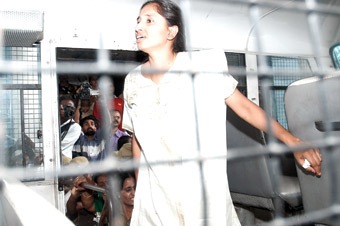
Murder most foul Sivarasan & Co wait for Rajiv; and accused Nalini
Photo: The Hindu Images
Why have you decided to write a book on the Rajiv murder case after 20 years?
I’m now 69 and I have been practising law since 1970. It was never my intention to write a book on the Rajiv case. I got involved with the case after many DMK cadres were detained by the police. I filed habeas corpus petitions in the Madras High Court against the illegal detention. They were released immediately. Later, Nalini requested me to appear for her in the trial court. When I took up her case, I knew it was a loser’s game. The court was hostile. The SIT was behaving as if it was above the law. Confessions went against her. The public and media were against the accused. I was told that I would get only 50 for appearing for Nalini. But I filed a petition for decent remuneration for legal services in Madras High Court. I fought her case for eight years and went through all records, evidences and cross-examined nearly 266 prosecution witnesses. It was not an easy task. I was a leading lawyer who could have made money with other cases. But I like to swim against the tide. After investing so much time and energy on this case, I wanted to tell the world what went wrong in the Rajiv murder case. It will be a consolation for 19 innocent people who spent almost eight years in jail without parole.
(For updates you can share with your friends, follow TNN on Facebook and Twitter )
